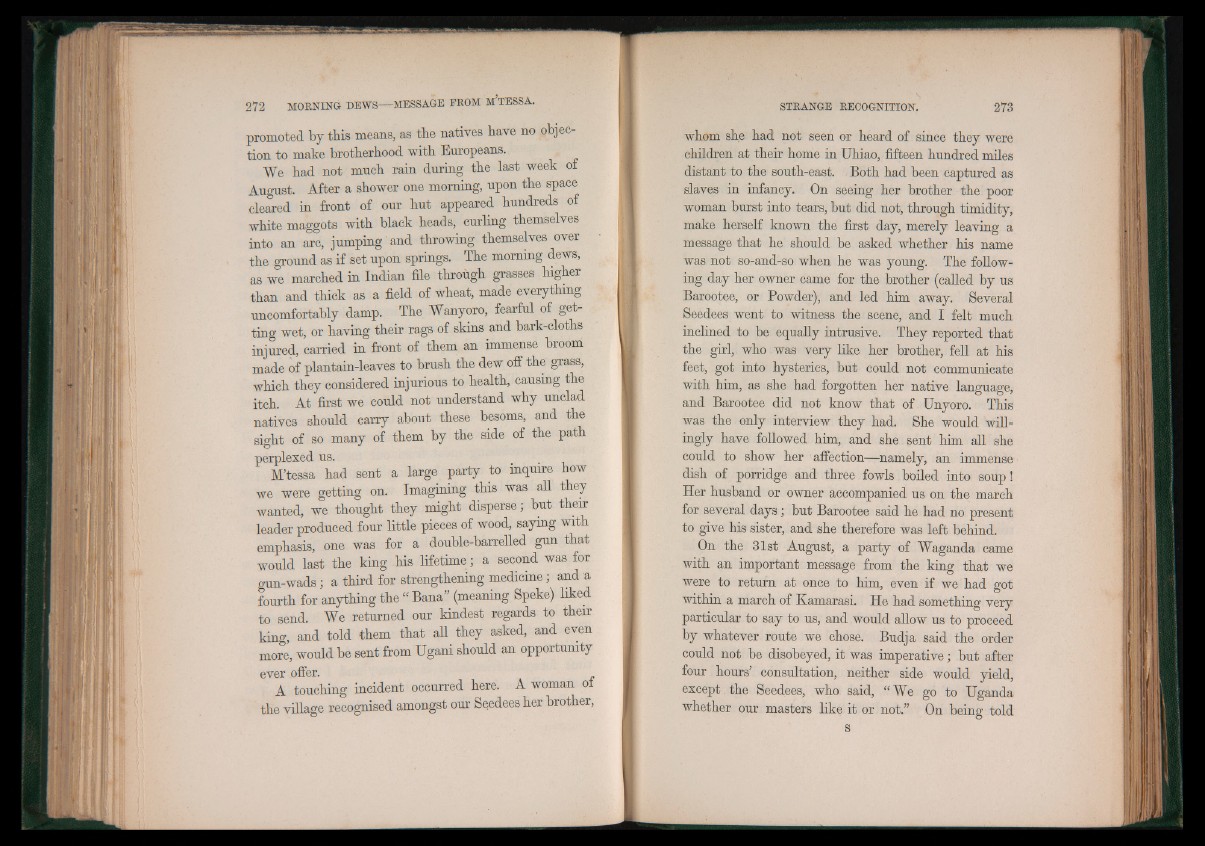
promoted by this means, as tbe natives bave no objection
to make brotherhood with Europeans.
We had not much rain during the last week of
August. After a shower one morning, upon the space
cleared in front of our hut appeared hundreds of
white maggots with black heads, curling themselves
into an arc, jumping and throwing themselves over
the ground as if set upon springs. The morning dews,
as we marched in Indian file through grasses higher
than and thick as a field of wheat, made everything
uncomfortably damp. The Wanyoro, fearful of getting
wet, or having their rags of skins and bark-cloths
injured, carried in front of them an immense broom
made of plantain-leaves to brush the dew off the grass,
which they considered injurious to health, causmg the
itch. At first we could not understand why unclad
natives should carry about these besoms, and the
sight of so many of them by the side of the path
perplexed us.
M’tessa had sent a large party to inquire how
we were getting on. Imagining this was all they
wanted, we thought they might disperse; but their
leader produced four little pieces of wood, saying with
emphasis, one was for a double-barrelled gun that
would last the king his lifetime; a second was for
gun-wads; a third for strengthening medicine; and a
fourth for anything the “ Bana” (meaning Speke) liked
to send. We returned our kindest regards to their
king, and told them that all they asked, and even
more, would be sent from Ugani should an opportunity
ever offer.
A touching incident occurred here. A woman ot
the village recognised amongst our Seedees her brother,
whom she had not seen or heard of since they were
children at their home in Uhiao, fifteen hundred miles
distant to the south-east. Both had been captured as
slaves in infancy. On seeing her brother the poor
woman burst into tears, but did not, through timidity,
make herself known the first day, merely leaving a
message that he should be asked whether his name
was not so-and-so when he was young. The following
day her owner came for the brother (called by us
Barootee, or Powder), and led him away. Several
Seedees went to witness the scene, and I felt much
inclined to be equally intrusive. They reported that
the girl, who was very like her brother, fell at his
feet, got into hysterics, but could not communicate
with him, as she had forgotten her native language,
and Barootee did not know that of Unyoro. This
was the only interview they had. She would willingly
have followed him, and she sent him all she
could to show her affection—namely, an immense
dish of porridge and three fowls boiled into soup!
Her husband or owner accompanied us on the march
for several days; but Barootee said he had no present
to give his sister, and she therefore was left beliind.
On the 31st August, a party of Waganda came
with an important message from the king that we
were to return at once to bim, even if we had got
within a march of Kamarasi. He had something very
particular to say to us, and would allow us to proceed
by whatever route we chose. Budja said the order
could not be disobeyed, it was imperative; but after
four hours’ consultation, neither side would yield,
except the Seedees, who said, “We go to Uganda
whether our masters like it or not.” On being told
s